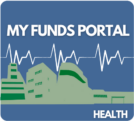Tips for a Healthy Ramadan
Ramadan is a special time of the year that brings increased spirituality, self-discipline, compassion and gratitude. If you fast during Ramadan, there are precautions you can take to stay healthy.
Key Attributes of a Healthy Ramadan
Ensure sufficient calorie intake and balanced proportions of macronutrients: Protein, Fat, and Carbohydrates.
Distribute carbohydrate portions evenly across each meal. Fasting can lead to consumption of large carbohydrate-heavy meals that impact blood sugar levels.
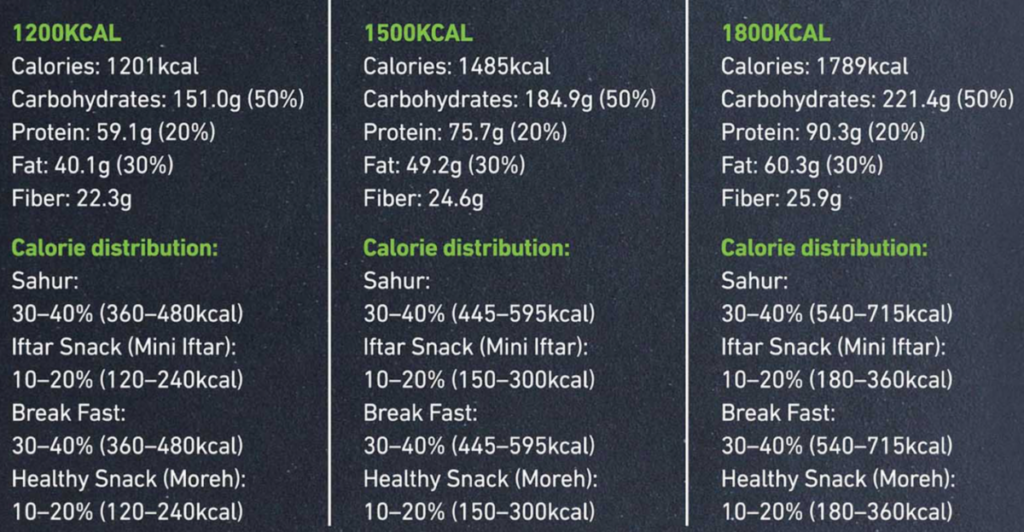
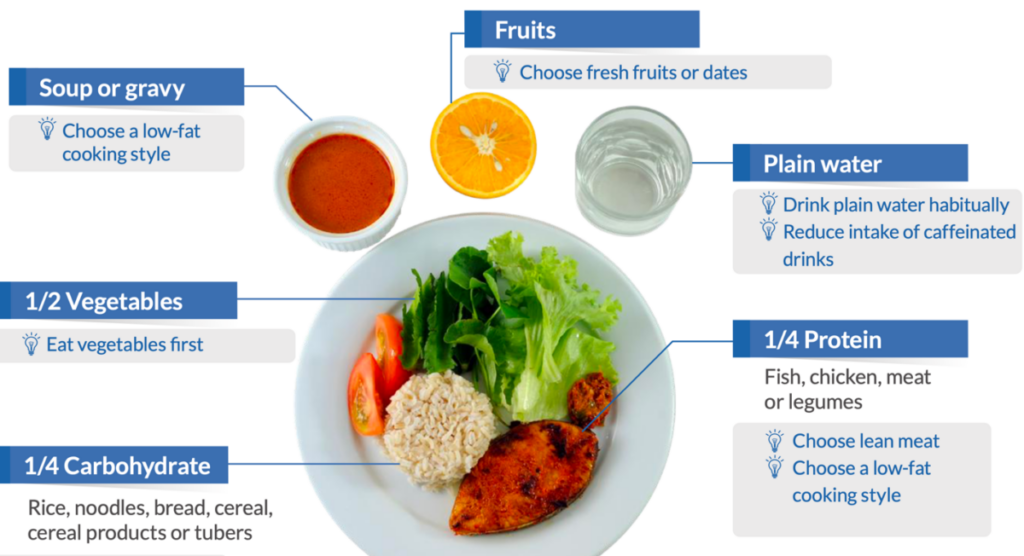
Choose whole-grain carbohydrates, and those that are higher in fiber.
Weight Maintenance and Reduction during Ramadan
Individuals who are overweight, obese, or have Type 2 Diabetes may find that Ramadan provides a good opportunity to lose weight.
Weight loss may significantly improve glycemic control and may reduce cardiovascular disease risk.
A healthy target is a modest and gradual weight reduction of 1-2 lbs. per week. To achieve weight loss or avoid weight gain, calorie intake should be controlled and kept within a specified target based on height and gender.
It is recommended to proportionally distribute carbohydrate and total caloric intake between Suhoor and Iftar, plus 1-2 snacks if necessary.
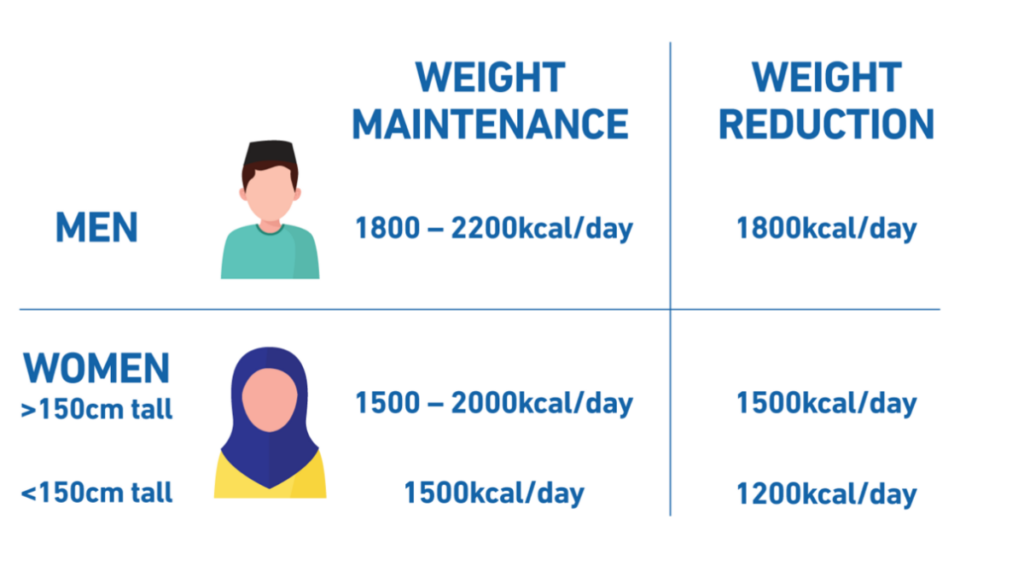
What to Eat
Ensure meals are well balanced. Variety of healthy foods and good nourishment are needed to compensate for the stress of fasting. Outlined below are the foods necessary to provide your body with the nutrients needed.
45-50% Carbohydrates
- Choose carbs with a low glycemic index: whole grains, legumes, non-starchy vegetables.
- Fiber intake of about 20-35 g/day (14g/ 1000 kcal) to provide long-lasting energy and satiety. Choose fiber from unprocessed foods such as vegetables, fruits, seeds, nuts, and legumes.
20-30% Protein
- Choose skinless poultry, fish, dairy, nuts, seeds, and legumes.
- Limit protein sources that are high in saturated fat, such as beef and lamb, to reduce risk of cardiovascular disease.
<35% Fat (<10% saturated fat)
- The TYPE of fat consumed influences cardiovascular disease risk.
- Eat Unsaturated fats (“Healthy fats”). These are also known as polyunsaturated (PUFAs) and monounsaturated (MUFAs).
- Choose olive oil, avocado oil, and fatty fish such as salmon, sardines, and tuna.
Low Glycemic Index Foods
Glycemic Index (GI) is a measure of how quickly a carbohydrate-containing food increases blood sugar levels.
Low-Glycemic Index foods will not increase blood sugar as quickly as High-Glycemic Index foods.
Low-Glycemic Index foods are usually wholegrains and high in fiber
Wholegrains
Minimally processed grains which still contain germ, endosperm, and bran layers. Processed cereals usually only contain the endosperm, thus stripped of fiber

Examples include brown rice, oats, barley, quinoa, rye.
High-Fiber
Fiber helps with satiety and slows down digestion, reducing absorption of carbohydrates and cholesterol. Examples include vegetables, fruits, whole grains, legumes, and oats.
What to Limit/ Avoid
Avoid sugar, refined carbohydrates, processed grains, and starchy foods. These should only be consumed in limited quantities.
Sugar-sweetened beverages and traditional deserts high in sugar.
White grains: white rice, white bread, potatoes, low-fiber cereals.
Protein sources higher in saturated fat increase risk of cardiovascular disease. Do not consume in excess, this is including red and processed meats such as beef, lamb, hot dog, deli meat.
Ghee and foods high in trans-fat: fast food, cookies, margarine, butter.

While grilling or baking can serve as a healthier option compared to frying, there are still ways to reduce saturated fat content of fried dishes without compromising taste, flavor, or tradition!
Try out some of these swaps for heart-healthy meals during Ramadan

Unhealthy Habits: that may arise during fasting
Postprandial: after eating
Hyperglycemia: high blood sugar
Hypoglycemia: low blood sugar
- Hyperglycemia caused by:
Unusually large meals at Iftar (more than 1500 calories).
Eating highly processed carbs & sugar at Iftar, or between Iftar and Suhoor.
Eating sugar-containing desserts after Iftar.
Large portions and frequent snacks between the two main meals.
Large portions of high glycemic index (GI) carbohydrates at Suhoor. - Hypoglycemia caused by:
Skipping meals at Suhoor or consuming meals for Suhoor too early.
Resulting in hypoglycemia before Iftar, especially in extended fasting hours. - Eating at fast speeds frequently leads to over-eating.
Satiety signals (fullness cues) take 20-30 minutes to reach the brain. - Eating fried foods too frequently
Includes trans-fat or oils rich in saturated fat (palm oil & coconut oil). - Changes in physical activity and sleeping patterns, which can affect metabolism and contribute to weight gain.
A body “at rest” has different energy needs.
Sleep impacts fuel uptake & utilization.
Timing
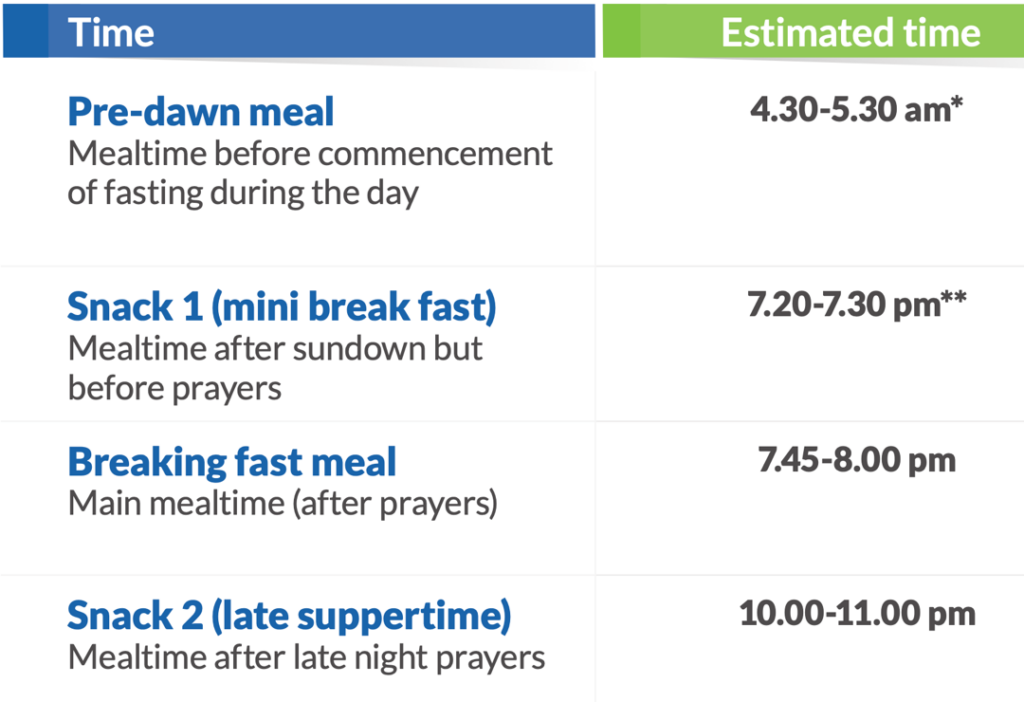
Stay Hydrated
Drink fluids several times throughout the night even if you aren’t feeling thirsty. Thirst is a signal that your body is already in need of water and may be dehydrated.
Caffeine-containing beverages do not count towards hydration and are diuretics which can lead to dehydration.
Do not drink too much water at one time, as there is the risk of diluting your body’s electrolytes and inducing what’s known as, “water intoxication”.
Incorporate water-containing foods into meals such as cucumbers.
Portion Size is Important
It takes the body 20 minutes to register that it’s had enough to eat. Eating quickly after breaking the fast should be avoided. Take your time, eat mindfully, and listen to hunger and satiety cues your body gives you.
This will allow for more energy and less stress on your body than eating huge amounts at one time.
Exercise during Ramadan
High intensity, rigorous exercise is not recommended because of the increased risk of dehydration and hypoglycemia.
Light-to-moderate exercise is encouraged, including walking. It is important to not be completely sedentary, while also being aware of the limitations and physical exhaustion that accompany fasting.
If you typically work out in the morning, try switching your physical activity to the evening after breaking your fast. Be sure to reduce the level of intensity from what you normally exercise at.
If you have diabetes, check your blood sugar more often
Diabetes risks minimized with a Healthy Ramadan Diet:
- Hypoglycemia, especially during the late period of fasting before Iftar.
- Severe hyperglycemia after each of the main meals.
- Dehydration, especially in countries with longer fasting hours and hot climates.
- Significant weight gain due to an increased caloric intake and a reduction in physical activity.
- Electrolyte imbalances.
- Acute renal failure in individuals prone to severe dehydration, particularly the elderly and those with impaired kidney function.
Fasting Exemptions
The following are usually considered exempt from fasting during Ramadan and can make up the fast at another time.
Young children; menstruating/ pregnant/ breastfeeding women; those traveling long distances; those with acute illness or chronic illness that would be harmed by the fast; frail or elderly; those unable to mentally comprehend the reason for the fast.
Celebrate!
This is the most joyous month of the year. While proper nutrition is vital to support your health and wellbeing during this time, it is also important to remember that this is a time of celebration.
Enjoy meals with others, exercise goodwill, and be patient and tolerant of your body and with others.
For additional guidance on nutrition, fasting, and Ramadan: schedule a 1:1 nutrition appointment!
On-site appointments are available at all 4 locations.
Brooklyn, Queens, Midtown, and Harlem Health Centers
Telephone appointments are also available.
Call any center to schedule your appointment, or book online at MyFundsPortal.com.
Contact us: T2D@hotelfunds.org
Amanda Heim: Queens + Harlem Health Center
Lia Huben: Brooklyn + Midtown Health Center
